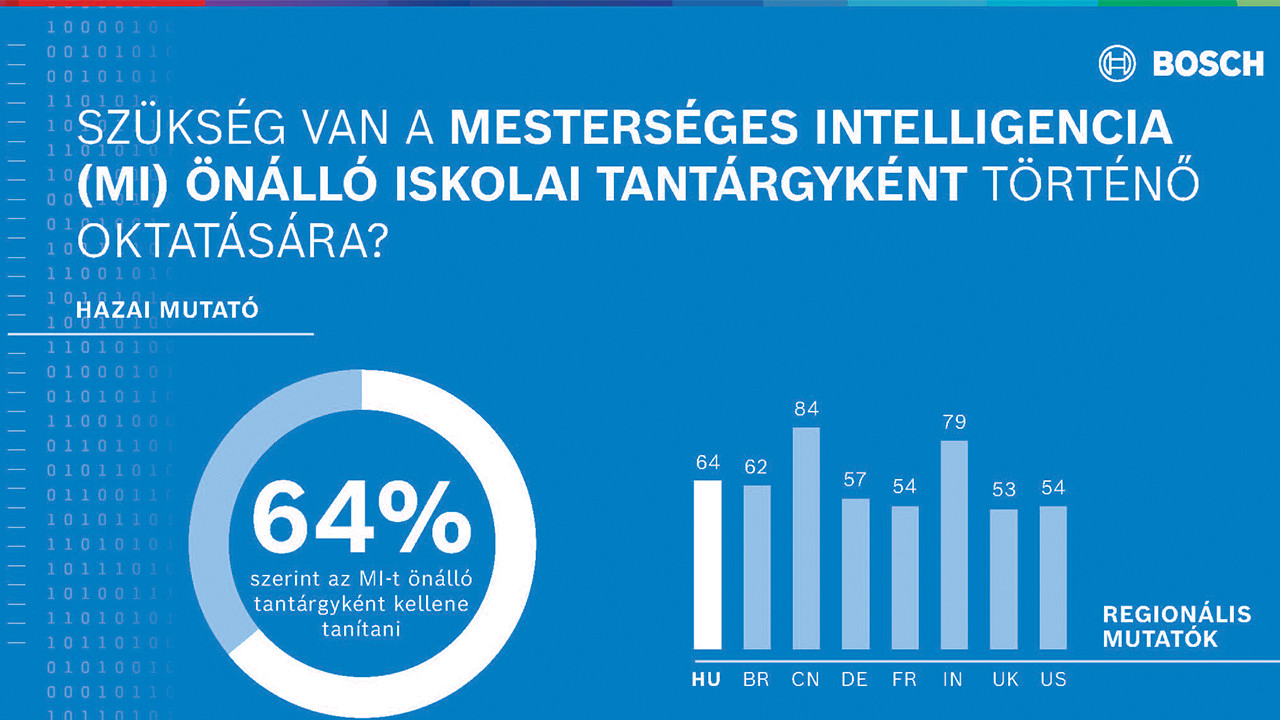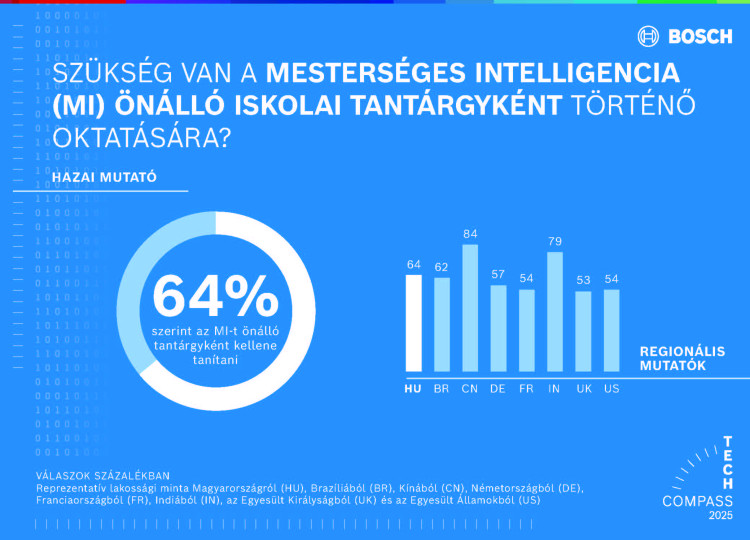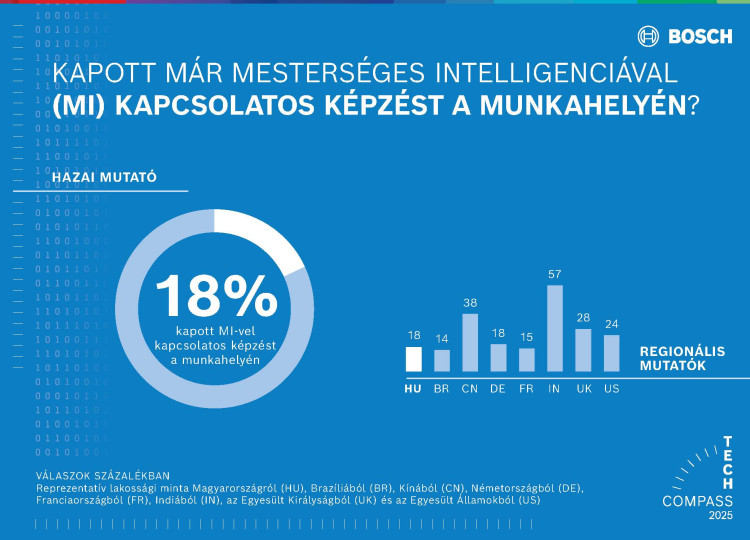Budapest – There is demand for the acquisition and training of artificial intelligence on both the employee and employer sides. Even though almost two-thirds of Hungarians consider it important to learn artificial intelligence, barely a fifth of those surveyed have received any training at their workplace. Moreover, half of the respondents do not plan to participate in any training but prefer to learn the skills on their own. In addition, nearly two-thirds of Hungarian respondents believe that artificial intelligence should be taught as a separate school subject. This rate is similar to the world average of 63%.
Respondents say they barely use AI in their workplaces on a daily basis
Barely 18% of Hungarians have received AI-related training at work, although it is planned for a further 11%. In global comparison, there is a gap of 10 percentage points. This may be related to the fact that half of the respondents plan to educate themselves on the subject, a quarter want to attend some kind of formal basic training, and a quarter do not wish to learn about AI at all. The lack of education is also reflected in usage: in Hungary, only 6% of employees use AI daily, and 10% on a weekly basis. In an international comparison, there is a significant difference: globally, 16% said they use this technology daily, and 21% said they use it every week.
Bosch supports its associates in acquiring AI skills
In this regard, Bosch stands out from the Hungarian trends. “Since the technology was introduced, we have fully supported our associates in learning how to use artificial intelligence. We have not only introduced the application of AI into automotive and other industrial technologies, as well as into our production processes, but during various training courses and workshops, colleagues were also able to learn about the opportunities, risks and benefits of using AI," said András Somogyi, Vice President of Human Resources at the Bosch Group in Hungary and the Adriatic region. He added that they keep in mind that it is vital for every generation to understand technological changes. “Knowledge is ageless. We are working to ensure that different age groups learn from each other and complement each other as a community, and this is no different in relation to artificial intelligence," emphasized András Somogyi. The company's own Artificial Intelligence Academy ("AI Academy") has been completed by 65,000 employees worldwide, with more than 1,000 employees already in Hungary. They also facilitate access to online AI training in the form of the so-called “eUniversity”. At the Bosch Group in Hungary, almost 200 employees work specifically with artificial intelligence, 70% of whom are data engineers.
AI education is becoming increasingly important in both workplaces and schools
It is very revealing that for 85% of Hungarians, it is "somewhat important" for their employer to offer training related to artificial intelligence when looking for a job. However, almost half of employees in Hungary fear that artificial intelligence could jeopardize their jobs in the future. “Artificial intelligence is transforming workplaces. It is important to emphasize that it supports people not only in everyday life, but also at work, allowing them to focus on other, creative processes instead of monotonous or difficult tasks," added András Somogyi.
International and domestic respondents also agreed that artificial intelligence has a serious impact not only on jobs, but also on education. In Hungary, 64% stated that AI should be taught as a separate subject in school, and 54% could also imagine certain subjects being taught by a virtual teacher. Despite the importance of AI, the majority also insists on traditional forms of education. According to research, AI is also an attractive professional prospect. 22% of Hungarians can imagine pursuing their professional career as an AI expert; globally this figure is 25%.
About the study
For the Bosch Tech Compass, the Gesellschaft für Innovative Marktforschung mbH (GIM) surveyed more than 11,000 people over the age of 18 in seven countries in fall 2024. In Germany, France, and the United Kingdom, 1,000 people per country took part; in Brazil, China, India, and the United States, it was 2,000 people each. The representative survey was also conducted in Hungary on behalf of the Bosch Group in Hungary, with the participation of more than one thousand people aged 18–69. Bosch was not named as a client at any point during the survey.
Mónika Hack
+36 70 510 5516
Bosch has been present in Hungary since 1898 with its products. After its re-establishment as a regional trading company in 1991, Bosch has grown into one of Hungary’s largest foreign industrial employers with currently eight subsidiaries. In fiscal 2023 it had total net sales of 2.207 billion forints and consolidated sales to third parties on the Hungarian market of 343 billion forints. The Bosch Group in Hungary employs more than 18,300 associates (as of December 31, 2023). In addition to its manufacturing, commercial and development business, Bosch has a network of sales and service operations that covers the entire country.
The Bosch Group is a leading global supplier of technology and services. It employs roughly 417,900 associates worldwide (as of December 31, 2024). According to preliminary figures, the company generated sales of 90.5 billion euros in 2024. Its operations are divided into four business sectors: Mobility, Industrial Technology, Consumer Goods, and Energy and Building Technology. With its business activities, the company aims to use technology to help shape universal trends such as automation, electrification, digitalization, connectivity, and an orientation to sustainability. In this context, Bosch’s broad diversification across regions and industries strengthens its innovativeness and robustness. Bosch uses its proven expertise in sensor technology, software, and services to offer customers cross-domain solutions from a single source. It also applies its expertise in connectivity and artificial intelligence in order to develop and manufacture user-friendly, sustainable products. With technology that is “Invented for life,” Bosch wants to help improve quality of life and conserve natural resources. The Bosch Group comprises Robert Bosch GmbH and its roughly 470 subsidiary and regional companies in over 60 countries. Including sales and service partners, Bosch’s global manufacturing, engineering, and sales network covers nearly every country in the world. Bosch’s innovative strength is key to the company’s further development. At 136 locations across the globe, Bosch employs some 86,900 associates in research and development, of which nearly 48,000 are software engineers.
Additional information is available online at www.bosch.hu, iot.boschblog.hu, www.bosch.com, www.iot.bosch.com, www.bosch-press.com, www.twitter.com/BoschPresse





